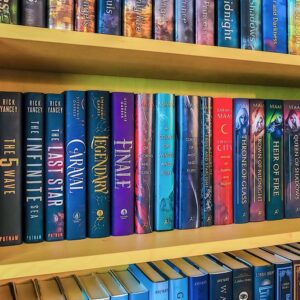How I Stumbled Into the YA Universe
I’ll admit it—I once believed young-adult (YA) fiction was only for teenagers. I rolled my eyes at the Twilight frenzy, skimmed past anything with high school hallways or prom nights, and told myself, “That’s not for me anymore.” But everything changed the day I picked up Eleanor & Park by Rainbow Rowell. I wasn’t just reading about teens falling in love—I was reliving the butterflies of first love, the raw ache of loneliness, and the bravery it takes to be vulnerable.
That one book cracked open a door I never intended to walk through. Now, I proudly say that young-adult (YA) fiction is one of my most cherished genres—and I’m not alone.
Young-Adult Fiction: A Genre Beyond Age
Let’s get this clear: young-adult fiction doesn’t mean childish fiction. It’s a category that centers around young protagonists, yes—but the themes? They’re anything but immature. Identity, grief, first love, mental health, social justice, survival—YA explores it all with honesty and urgency.
Whether you’re 16 or 60, YA fiction connects with emotions we’ve all experienced. That’s the magic of it—it takes you back and pulls you forward, all at once.

Why Adults Are Gravitating Toward YA Fiction
Emotional Honesty and Raw Storytelling
One of the biggest reasons I, and so many other adults, keep coming back to young-adult fiction is because of its emotional transparency. There’s something so refreshing about characters who aren’t jaded yet—who are still figuring things out, questioning the world, and making mistakes that feel world-ending.
In a world full of cynicism, YA offers a kind of emotional reset.
Fast-Paced and Engaging Plots
Let’s be honest—adult literary fiction can sometimes drag. YA authors know how to hook readers. With high stakes, cliffhangers, and deeply emotional narratives, young-adult fiction doesn’t waste time getting to the good stuff.
Diverse Voices and Important Themes
YA fiction is also leading the charge when it comes to diversity—LGBTQ+ stories, characters of color, mental health narratives, and feminist themes are not only present, they’re central. Books like The Hate U Give by Angie Thomas or They Both Die at the End by Adam Silvera aren’t just entertaining—they’re powerful, relevant, and deeply moving.
Best YA Books That Adults Will Love
If you’re wondering where to start, here are some YA novels that adults often fall in love with:
The Book Thief by Markus Zusak – A haunting tale set during WWII, narrated by Death itself.
A Court of Thorns and Roses by Sarah J. Maas – A fantasy romance that’s as much about personal power as it is about magic.
Looking for Alaska by John Green – A poetic exploration of love, loss, and the meaning of “the great perhaps.”
These stories may be categorized as young-adult fiction, but their impact is timeless.
Internal Conflict Mirrors Adult Realities
The struggles YA characters face—uncertainty, identity, navigating relationships—don’t vanish when you grow up. In fact, adulting often brings back those very same questions. YA just helps you look at them with fresh eyes.
Breaking the YA Stigma
There’s still a cultural stigma around adults reading young-adult fiction. Some see it as regressive or unserious. But the truth? Good storytelling doesn’t come with an age label. I’ve laughed, cried, and felt more seen reading YA books than I have reading some so-called “mature” literature.
Let’s stop pretending that grown-up problems always require grown-up fiction.
YA Fiction for All Ages
YA is not a phase. It’s a reflection of emotions, transformation, and resilience. Whether it’s fantasy, contemporary, dystopian, or romance—YA fiction for all ages is a real thing.
So next time someone raises an eyebrow at your YA bookshelf, just smile and hand them a copy of The Fault in Our Stars. Let the story speak for itself.
Young-Adult Fiction in 2025: A Cultural Phenomenon
The resurgence of young-adult fiction in 2025 is impossible to ignore. From Netflix adaptations to BookTok recommendations, YA books are shaping pop culture. Adults aren’t just passive observers—they’re enthusiastic participants in the fandoms and conversations around these stories.
In fact, if you’re curious about how genre fiction is thriving this year, check out romantasy books in 2025 : a magical escape another blog I wrote on why romance and fantasy are getting so popular in 2025.
It’s Time to Rethink YA
Young-adult fiction is not just for teens—it’s for anyone who has ever felt lost, hopeful, heartbroken, or brave. And isn’t that all of us?
So the next time you’re browsing your TBR pile, don’t skip the YA shelf. You might just find your next favorite book there.
Have you read a YA book that unexpectedly stayed with you? I’d love to hear your recommendations—drop them in the comments below!
